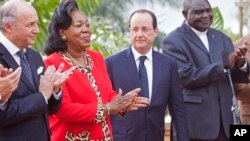BANGUI —
French President Francois Hollande was in the Central African Republic Friday for the second time in just over three months. He was visiting the French troops stationed in the country, as well as consulting with the new CAR government and with religious leaders.
Since December, when inter-religious violence flared in the CAR, France has had 1,600 troops in the country, who were reinforced with 400 new arrivals this week. Last week, their mandate was extended by six months.
After visiting the soldiers of the French mission and thanking them for their work, the French president held talks with transitional President Catherine Samba Panza and with Catholic, Protestant and Muslim leaders.
Speaking to media, he compared what he had just seen in Bangui with what he saw during his last visit in December, when two French soldiers had just been killed, tens of thousands of people had fled to a camp at the airport to escape violence, and the rest of the city looked like a ghost town.
He said he has been on the streets of Bangui during the day - not everywhere but where was driven - and he has seen that life is getting back to normal, shops have reopened and commercial activity has restarted although there is a lot still to do.
Hollande attributed this progress to the French and African Union peacekeepers, and to the CAR government, which he said under its new president had restored international confidence.
Setting out the next steps, the French president said French troops would continue restoring order in towns in addition to the capital.
The objective, he says, is to free up main roads and to accompany the government toward areas of the country where certain people might think they are cut off from the rest of the nation.
This was a hint that French troops will deploy eastwards, toward areas currently controlled by the Seleka armed movement, which seized power in Bangui a year ago but has recently retreated from most of the western CAR.
There was still inter-religious violence although less than there was, Hollande said, adding that certain groups must be rendered harmless and there should be no impunity.
Finally Hollande made the major announcement of his visit - France and central African states have agreed to help fund the CAR government, which has virtually no funds at the moment, so that police and gendarmes, teachers and health workers can get back to work.
He thanked the regional heads of state for their understanding and said France would also play its part and everything would be done so that from next week the CAR president would have an administration that can work. That was our obligation, he emphasized.
Leaving for the airport, Hollande encouraged the new administration to get to work and to break with bad practices of the past, such as corruption.
Since December, when inter-religious violence flared in the CAR, France has had 1,600 troops in the country, who were reinforced with 400 new arrivals this week. Last week, their mandate was extended by six months.
After visiting the soldiers of the French mission and thanking them for their work, the French president held talks with transitional President Catherine Samba Panza and with Catholic, Protestant and Muslim leaders.
Speaking to media, he compared what he had just seen in Bangui with what he saw during his last visit in December, when two French soldiers had just been killed, tens of thousands of people had fled to a camp at the airport to escape violence, and the rest of the city looked like a ghost town.
He said he has been on the streets of Bangui during the day - not everywhere but where was driven - and he has seen that life is getting back to normal, shops have reopened and commercial activity has restarted although there is a lot still to do.
Hollande attributed this progress to the French and African Union peacekeepers, and to the CAR government, which he said under its new president had restored international confidence.
Setting out the next steps, the French president said French troops would continue restoring order in towns in addition to the capital.
The objective, he says, is to free up main roads and to accompany the government toward areas of the country where certain people might think they are cut off from the rest of the nation.
This was a hint that French troops will deploy eastwards, toward areas currently controlled by the Seleka armed movement, which seized power in Bangui a year ago but has recently retreated from most of the western CAR.
There was still inter-religious violence although less than there was, Hollande said, adding that certain groups must be rendered harmless and there should be no impunity.
Finally Hollande made the major announcement of his visit - France and central African states have agreed to help fund the CAR government, which has virtually no funds at the moment, so that police and gendarmes, teachers and health workers can get back to work.
He thanked the regional heads of state for their understanding and said France would also play its part and everything would be done so that from next week the CAR president would have an administration that can work. That was our obligation, he emphasized.
Leaving for the airport, Hollande encouraged the new administration to get to work and to break with bad practices of the past, such as corruption.




